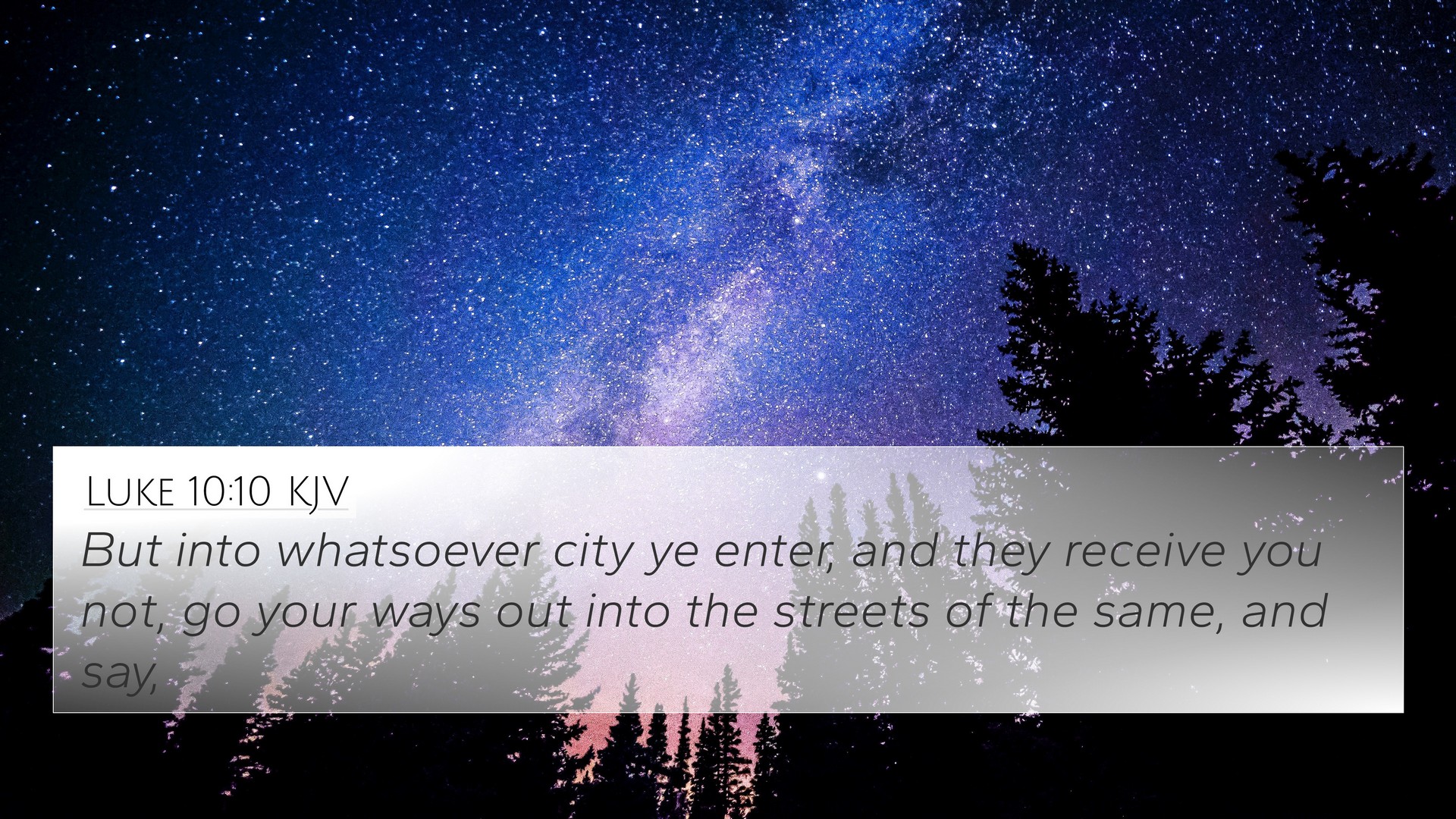Understanding Luke 10:10
Luke 10:10 states: "But whatever city you enter, and they do not receive you, go out into its streets and say," This verse is part of Jesus' instructions to His disciples as He sent them out to preach and heal, emphasizing their role in the mission of spreading the Gospel.
Summary of Biblical Commentary Insights
This verse highlights several key themes that are elaborated in public domain commentaries from scholars such as Matthew Henry, Albert Barnes, and Adam Clarke:
- Rejection of the Message: Jesus foresees that not all cities will receive His disciples. This foretells the reality of rejection faced by those spreading the Good News (Henry).
- Responsibility of the Disciples: The disciples must recognize their responsibility to proclaim the message even in the face of hostility (Barnes).
- Symbolic Act of Judgment: Going out into the streets symbolizes a public declaration of what has occurred, serving as a warning to the city for rejecting the message (Clarke).
- The Role of Peace: Earlier in the chapter, Jesus instructed them to bring peace to the places they visit, indicating the importance of their role as peacemakers (Henry).
- Persistence of Mission: The act of shaking off the dust signifies that the mission continues, reflecting a need for perseverance despite opposition (Barnes).
- God's Sovereignty: The rejection of the Gospel message does not thwart God's plan; rather, it is part of the larger narrative of free will (Clarke).
- Lessons on Hospitality: The rejection serves as a teaching moment about the importance of hospitality and openness to spiritual truth (Barnes).
Cross-Referencing Biblical Texts
This verse connects with several other scriptures, enhancing our understanding through comparative Bible verse analysis:
- Matthew 10:14: "And whoever will not receive you nor hear your words, when you depart from that house or city, shake off the dust from your feet."
- Acts 13:51: "But they shook off the dust from their feet against them, and came to Iconium."
- Luke 9:5: "And whosoever shall not receive you, when you go out of that city, shake off the very dust from your feet for a testimony against them."
- John 15:20: "Remember the word that I said unto you, The servant is not greater than his lord. If they have persecuted me, they will also persecute you."
- 2 Thessalonians 3:6: "Now we command you, brethren, in the name of our Lord Jesus Christ, that you withdraw yourselves from every brother that walketh disorderly, and not after the tradition which he received of us."
- Matthew 11:21: "Woe unto thee, Chorazin! woe unto thee, Bethsaida! for if the mighty works, which were done in you, had been done in Tyre and Sidon, they would have repented long ago."
- Hebrews 11:6: "But without faith it is impossible to please him: for he that cometh to God must believe that he is, and that he is a rewarder of them that diligently seek him."
Thematic Connections
The theme of rejection and perseverance is prevalent across the New Testament. When studying the connections between Bible verses, one should consider:
- Hospitality and Spiritual Reception: Numerous verses connect to the idea of how one's reception to the Gospel affects their spiritual fate.
- The Role of Discipleship: Insights into the tasks and challenges faced by early disciples resonate throughout the Gospels.
- Judgment and Mercy: The tension between God's mercy and the judgment on those who reject the Gospel forms a continuous narrative thread.
Tools for Further Study
For deeper exploration of Bible verse connections, consider utilizing the following:
- Bible Concordance: A reference tool that helps locate scripture references for words and themes.
- Bible Cross-Reference Guide: Provides systematic connections between verses across the scriptures.
- Cross-Reference Bible Study: Methods to integrate these references for sermon preparation or personal study.
- Bible Reference Resources: Comprehensive materials that provide insight into related verses and themes.
Conclusion
In conclusion, Luke 10:10 serves as a powerful reminder of the challenges inherent in proclaiming the Gospel. Through examining cross-references and thematic connections, one can gain a fuller understanding of its implications and how it interweaves with the broader message of scripture.






